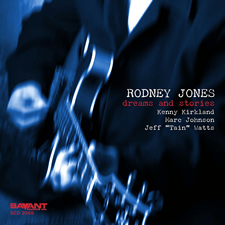Slate: Hip Hop influence on jazz?
 While hip-hop has devolved time and again into disposable pop, it has never lost its vitality as an underground, alternative art form. This is the aspect of hip-hop that jazz musicians are responding to; they're encountering hip-hop on creative rather than commercial terms. And they're refuting the popular view that today's jazzers are stuck in the '50s and '60s. -Slate
While hip-hop has devolved time and again into disposable pop, it has never lost its vitality as an underground, alternative art form. This is the aspect of hip-hop that jazz musicians are responding to; they're encountering hip-hop on creative rather than commercial terms. And they're refuting the popular view that today's jazzers are stuck in the '50s and '60s. -SlateWe've heard a lot about the jazz influence on hip hop, and likewise, how jazz musicians and hip hop artists have worked together and collaborated on various projects, but this article from Slate talks about something a little different, the hip hop influence on "acoustic" jazz. Blue Note's newest artist, pianist Robert Glasper, has been touted for his "hip hop" influence. He's certainly worked with many of the biggest names in the creative side of that genre (Q-tip, Mos Def, etc), but his new record is most certainly a jazz record, not a crossover project like Roy Hargrove's RH Factor - no mc's or turntables, or even samplers, etc. To my ears, it's pretty much an excellent straight ahead, Herbie Hancock/Miles 2nd 5tet inspired record. Blue Note has issued press materials talking about the hip hop influence on Glasper's style:
The second time around, the true nature of the music begins to reveal itself, not as much aurally as sensually. The bass is warmer, phatter, more sanguine, the drums throb, and the piano dances freestyling swing moods.
Freestyling swing moods? Hip hop influence? I hear that term as being nothing more than a poor attempt by a PR hack to try to put a new, marketable spin (we've gotta have something for the press to write about!) on something jazz musicians have been doing for decades.
I'm not saying that Glasper isn't influenced by hip hop, (R&B artist Bilal makes a guest appearance on this new record in fact) just that this is more of an example of a record company using a hip hop connection to sell the album, or at the very least make it stand out in a genre filled with countless reissues and self produced albums that all do pretty much the same thing. Where Blue Note's PR people hear "phatter bass" - I hear a fine jazz bass player, where critic Ben Ratliff observes that the "group has its own crisp, skittering cooperation, with hip hop in its bounce", I hear the bounce, but those rhtyhms aren't coming from hip hop, it's a jazz feeling all the way. If anything I hear more of a Brad Mehldau influence on Robert's playing (he occasionally pulls out a Brad-ism here and there) than hip hop.
Perhaps this marketing spin, or being more generous to Ratliff and Blue Note, perhaps it's just things coming full circle. The improvisitory nature of jazz inspires hip hop mc's and their freestyling, infuses pop culture, and now we have PR folks calling a jazz pianists improvised solo "freestyling swing moods." Certainly hip hop has influenced jazz musicians, but I just don't think that Glasper's new cd is the best example of such a trend.
The article in Slate by David Adler - Two Turntables and a Saxophone - How jazz plays off hip-hop which prompted this particular post (and deals with more than just Robert Glasper) is available here.








